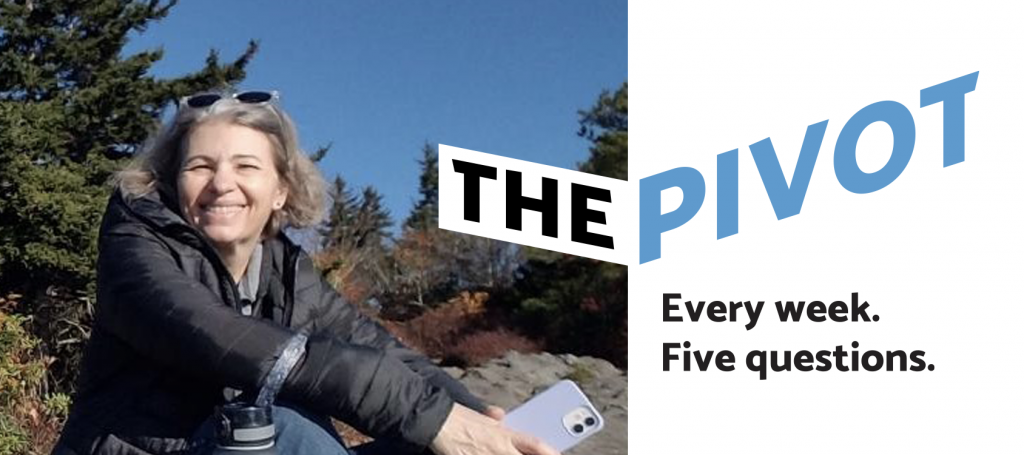Jill Moore analyzes NC public health law to educate and advise local leaders.

What’s your role in public health?
Let me start by saying I am a double alum of the Gillings School! I earned a bachelor’s degree and a Master of Public Health at Gillings.
Now, at the UNC School of Government, I teach legal issues in public health to working professionals, especially those who work in or with North Carolina local health departments. While that includes local health directors and health department employees, it also includes others in the local government who work with the health departments, including county attorneys. I also advise for the School of Government, which involves answering questions about N.C. public health law to those same working professionals.
I also serve — at present — as secretary of the faculty for UNC-Chapel Hill. That’s a role where I’ve found my background in working with local governments and public health officials to be useful. The Secretary handles many procedural matters associated with meetings and framing legislative actions, like resolutions and issues of governance. Since I’ve been at the School of Government for nearly 25 years, I’ve been steeped in a lot of the processes that are important to those kinds of actions.

Can you describe your focus area in one sentence?
I focus on legal issues affecting N.C. local health departments.
That covers a lot of ground. I work on projects in areas ranging from Board of Health rulemaking authority to medical confidentiality and the Health Insurance Portability and Accountability Act (HIPAA) to child and adolescent health and immunizations. I am also working on a wide variety of issues related to COVID-19.

What brought you to public health?
I have a background in public health first and law second. As a student at Carolina, I was interested in a lot of different things and had difficulty choosing a major. My undergraduate advisor was the late Dr. Ralph Boatman, who was with the then-Department of Health Education. [This is now the Department of Health Behavior.]
He looked at the subjects I gravitated toward and noticed that I was keenly interested in social psychology and biology and had taken health and anatomy classes. He said, “Have you ever heard of public health? Because I think you’d like it.” And though I had never heard of it, he said, “You belong in my department.”
It turned out this discipline I had never heard of was, in fact, exactly the right focus for me.
After graduating, I worked in public health for about five years. In doing that work, I came to recognize what a significant role law and policy makes to effective population health. I went to law school hoping that, when I got out, I would be able to find a way to blend my public health background with my new knowledge of the law. I was extremely fortunate that, the year after I graduated, a faculty position focused on public health law came open at the School of Government. That’s what I’ve been doing ever since.
I never wanted to work in anything but public health, and I surprised myself by going for a law degree. I started out as a public health educator and did not foresee that as being part of my professional background, but once it became clear to me that law and policy really have a tremendous effect on how well you can achieve public health goals, I was hooked.

How have you pivoted in response to the coronavirus pandemic?
My initial pivot came in how I spent my time, because N.C. communicable disease law has been one of my main areas of focus for nearly 25 years. But the sheer amount of time I devoted to that topic in comparison to the other public health law topics that I work on certainly increased dramatically. For me, that started in January 2020.
The pivot I really didn’t expect is an ongoing one regarding how long-standing public health laws — both in N.C. and nationally — are applied and challenged during a pandemic. That’s been eye-opening.
In late 2019, I was beginning to work on a project related to childhood vaccination laws and how they were starting shift little-by-little in response to some major measles outbreaks in the late 2010s. Public health orders associated with those outbreaks in other states prompted litigation and legislation. I was watching that closely. At the time, it certainly looked like the law was holding steady in favor of vaccine requirements — especially for children — and becoming less favorable toward exemptions that weren’t medical in nature.
The lawsuits challenging COVID-19 vaccine requirements now seem like they might be shifting in a direction that is different than I thought. We as a country may well be going the opposite direction on non-medical exemptions. Also, the questions of which levels and branches of government have the authority to require vaccination in different settings is now in discussion.
I compare it to tectonic plates that shift and cause earthquakes. I wonder what the landscape will look like in the aftermath. I’m also keeping a close eye on how some United States pandemic policies have emphasized individual health benefits rather than population benefits. I’m wondering if we, as a society, are redefining public health in a way that elevates individual needs and responsibilities over collective action? That would be quite a pivot for the entire field.

Who are you when you’re at home?
I am a family person above everything else. That’s the most important thing to me. I’m still very much a mom, even though my kids are in their twenties and don’t live with me anymore. I talk or text with them most days, and that connection is important to me.
I spend most of my free time hanging out with my spouse, who I met at the School of Public Health all those years ago. He got his doctoral degree in epidemiology. We’ve been married nearly 30 years. We like to spend time with our closest friends, and we travel a lot.
During the pandemic, we’ve been scratching the travel itch by driving to states and national parks where we can hike. We’ve visited our daughter in New York, too. We have a goal of visiting all the national parks, and I think we’ve been to more than 30 so far.
It’s hard to pick a favorite, but I lean toward the high desert. Any of the Utah parks or Big Bend in Texas. I think I must have been a desert rat in a previous life.
Read more interviews in The Pivot series.
Published: 02/19/2022

